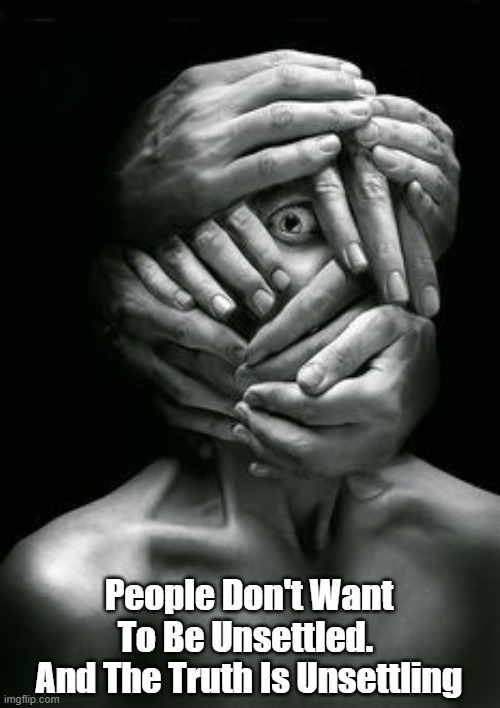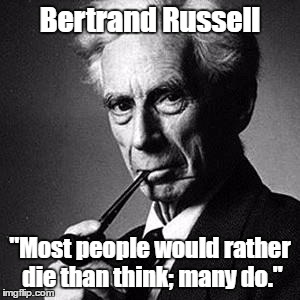Republican Vision Of A Reading List That's Acceptable For Public Instruction (And "A Failsafe Way To Restore Integrity And Vigor To America's Sick Body Politic: Two Years Of American History - Taught Dialectically - As A Prerequisite For High School Graduation")
Compendium Of Best "Pax" Posts On The Cornerstone Necessity Of Education
Compendium Of Best "News From Barbaria" Posts Concerning Democracy - And The Indispensable Role Played By Education In The Survival And "Thrival" Of Democracy
Stupidity: Democracy -- In Any Of Its Manifestations -- Just Doesn't Work Without An Educated Citizenry That Believes In The Common Good And A Modicum Of Compromise
"The Daily Show" Jordan Klepper Probes The Likelihood Of Civil War
St. Thomas Aquinas, Catholicism's foremost "Doctor of The Church," is credited with observing: "Beware the man of one book." https://en.wikipedia.org/wiki/Homo_unius_libri
The most narrowing, stunting, intellectually damaging, and spiritually-dwarfing of all beliefs is the "bible-based" assertion that "God said it. I believe it. That settles it." (The same holds true for the parallel Quranic assertion...)
Even on the face of it, there is no proof that "God said it."
Yes, assertions may -- in their own limited (and limiting) way -- be beneficial insofar as they "settle" people's minds and souls, but even "True Believers" can not "get beyond" the faithful assertion that "knowledge" is outside the domain of faith.
It may even be that "for those with faith, no proof is necessary, and for those without faith, no proof is possible." (This is gist of an observation by Thomas Aquinas.)
But it is also an observable truth that such believers are afraid of widening their perspectives, and so they hunker down in sealed "information siloes," trying to control and manage their world view so that only their self-chosen suppositions count.
These narrow-minded "people of one book" (or "one idea") justify their intellectual and spiritual stuntedness by constant repetition of St. Paul's declaration that "the wisdom of the world is folly before God," blithely assuming that they - and they alone - are the final arbiters of what constitutes "the wisdom of the world".
Judging by the lickspittle adulation of white "Christian" Trump Cult, "The Donald" (who also happens to be frontrunner for Messianic False Prophet) is considered the only inerrant soothsayer currently residing on earth.
"The Confirmation Bias Bubble" in which "Christian" "conservatives" live is absolutely impermeable, completely impenetrable.
"Confirmation Bias And The Power Of Disconfirming Information"
Clearly, many people dread being unsettled.
So, to persuade themselves that their beliefs transcend belief, thereby entering into the domain of ABSOLUTELY CERTAIN KNOWLEDGE, they declare themselves God's "cognoscenti" - the "chosen few" who REALLY, TRULY know GOD'S TRUTH and GOD'S WILL.
In my life, I have known many people who refuse to undertake honorable, truth-seeking experiments because they might learn something that contradicts their adamantly-held beliefs, which is to say the simple (and over-simplifying "truths") that their minds are able to tolerate.
The following experiment (which requires 50 hours of time) would persuade many cultists that they have mutilated themselves by sleeping in Procrustes' Bed.
Of course, many people -- for example, the ubiquitous "trolls" who delight in falsehood and deception -- sound cautionary notes "all along the watchtower."
Be that as it may, the gist of my method is for practitioners to choose a "List of Most Notable/Influential Humans" such as "1000 Years, 1000 People. https://www.wisdomportal.com/Books/1000Years1000People.html
Then, every day (or every week day) for 100 days, spend half an hour reading the Wikipedia (or Britannica) entry for each "notable" on the list.
It would be best if practitioners of this method worked as "duos" in order to discuss memorable findings.
As an aside, I will mention that educators could create fruitful middle school and high school curricula around such lists of notable/influential people.
If nothing else, self-mutilated minds and souls who actually invest a "work week" (over few months) will either dislodge the log jam in their deliberately-crafted small minds, or they will be made aware that "the world is a big and richly varied place" that they must stonewall if they still feel compelled to nix "the fullness of truth" which is Truth that is only revealed by rich contextualization.
Self-maimed "true believers" are already dimly aware of their mutilation which explains their ferocious determination to subscribe to educational methods that circumvent any need to think "in deep context," which is to say educational methods that exempt them from taking in a steady flow of new information from a wide range of sources.
"How Self-Taught Philosopher-Longshoreman Eric Hoffer, Author Of "The True Believer," Judges A Government, Or A Way Of Life"
"The True Believer"
As 12th century Sephardic physician and philosopher, Maimonides noted: "We must accept truth from whatever source it comes."
The flip side of Maimonides observation is that "we can only accept those truths we personally approve of if we are under any compulsion to deny truth from 'heretical' sources."
As I write, I observe that Maimonides would be an excellent choice for launching my proposed experiment for reading about 100 notable/influential human beings over the course of several months.
Here is Maimonides' Wikipedia entry: https://en.wikipedia.org/wiki/Maimonides
And, here is his Britannica entry: https://www.britannica.com/biography/Moses-Maimonides
I will conclude by recommending this practice for couples - even those who consider themselves well-educated... even more so for those who are widely recognized as well-educated.
EN.WIKIPEDIA.ORG



















No comments:
Post a Comment